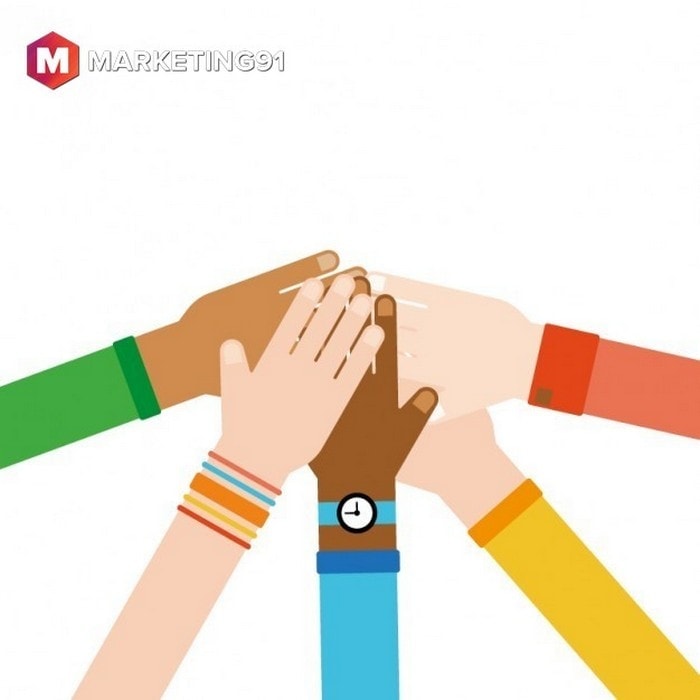Often the skills that are required to deal with people or manage people is known as people skills or soft skills or also termed as interpersonal skills. Interpersonal skills are essential when employers are hiring and are used as a criterion to evaluate candidates regardless of the job.
It is very crucial to have excellent interpersonal skills to get along with superiors or seniors or coworkers and even external stakeholders like vendors and customers.
Table of Contents
What are Interpersonal Skills?
They are also called as employability skills where in the world employability is to suggest the importance of those skills. Emotional intelligence is one of the important factors for defining interpersonal skills since both of them are related to each other.
It is group up of traits communication social graces friendliness, language, optimism, and personal habits which are used to characterize the relationship between the people we interact and us.
Following are a few examples of interpersonal skills:
#1 Communication
This is one of the most important interpersonal skills that is required in any and every job. The person can be working in any industry and any sector but clear, communication is something that is a basic requirement.
The person should be able to communicate effectively and clearly with the use of both verbal and nonverbal communication. Sometimes the person may also be required to have good public speaking skills.
Communication as an interpersonal skill is useful for any person to develop relations both business and beyond with any other person, employer, senior, colleagues, or even competitors.
Communication is classified into the following types:
#1. Verbal communication:
Verbal communications include both the part where you talk and how you discover and receive the talk. Jobs like a sales job, teaching job, motivational speaker are few of the jobs which require communication as an important interpersonal skill.
A person with good verbal communication is highly valued by many employers.
Verbal communication and businesses include but is not limited to:
- Communicating with supervisors about an appropriate course of action.
- Providing feedback to the employer for colleagues.
- Showing interest in others and inquiring about them.
- Communicating calmly in spite of being stressed out.
- Training juniors.
- Asking for clarification from the customers.
- In order to stimulate dialogue asking open-ended questions.
- Promoting a product or service.
#2 Nonverbal communication:
This refers to the expressions of gestures, even tone of voice or body language, eye contact, posture, and other similar ways in which people communicate without the use of verbal communication. Nonverbal communication is very important in interpersonal skills, especially when practicing for an interview or a meeting.
A presenter in a meeting has to pay attention to is not only verbal gestures but also nonverbal expressions. More often than not, people tend to forget that nonverbal communication is a mirror of the body. Mastering nonverbal communication requires constant practice.
Following are a few examples of nonverbal gestures:
- Sitting with backstreet against the chair or leaning slightly ahead at about 45-degree angles in order to convey engagement in the discussion.
- Use of hand gestures official expressions in order to to make a dynamic presence.
- Avoiding of shaking of limbs or fidgeting.
- Understanding the difference between listening and hearing and using each at the appropriate time.
- Having open arms, since folded arms can convey defensiveness to others.
#2 Conflict management
Whether the person is an individual contributor or a manager of people, he will always come across a situation where he will have to resolve conflict. Conflict resolving the main valve solving an issue between two staff members or between your juniors or between yourself and customer of the organization.
The keys interpersonal skills required here is to listen attentively and fairly to both sides and provide a creative solution in order to arrive at a proper solution of the problem and make both the sides a win-win situation.
Problem-solving skills, along with proper counseling and mediating skills required for good conflict management.
The ultimate aim of conflict management should not be winning but should be of proper resolution. Communicating empathetically and clearly along with patience often leads to outcomes which are favorable for the parties involved and also helps to nurture the professional relationship.
It is essential that the conflict should be addressed at initial stages rather than waiting for it to you all win a quarrel or a big issue. The person should understand the participants who are involved in the conflict and should formalize.
The person who is present to solve manage the conflict should have active listening skills and leadership skills so that he is able to hear both the sides with equal the tension and can help to mediate and arrive at a proper solution.
Patience is another virtue which is required in conflict management since there may be multiple times when the person has to mediate, and the solution may not have arrived in one go. Negotiations are another interpersonal skill which would be required in order to facilitate conflict management smoothly.
Conflict management requires a person to be self-aware and optimistic and also be motivated during all time. The person should be helping others and forgiving transgressions in order to arrive at a better resolution.
He should be accountable and should manage emotions in order to give or pass a better decision. You should also have good self-control over others and should be able to embrace different opinions of different people.
#3 Self-confidence
Self-confidence is the ability to trust in your own self to carry out a particular task. It is the inner sense of assuredness, which will help you to answer all the questions when asked in a particular situation. It is also the ability to be confident and have a belief and faith in your abilities.
For example, if in a situation you asked all faced with certain problem or questions the way those questions are hundred and answered by you shows the amount of self-confidence that you have in yourself. Self-confidence is also optimistic and positivity when a particular task is handed over for the competition.
Having the ability to trust yourself to work through the task and overcome all the hurdles is what self-confidence is. Self-confidence is also their surety that you provide to the people that you are competent enough to carry a particular task when assigned to you.
Self-confidence originates from trust and confidence in your own self. We are often faced with a situation wherein self-confidence is there any way to get ahead and carry out the particular task of a situation or solve a problem.
There is a very fine line of difference between confidence and self-confidence. While self-confidence is the minimum required confidence for any person.
#4 Empathy
Everyone has a situation where there is a need for you to understand another person. It can be a colleague, employee, or manager. This is often known as empathy wherein if for example, the customer calls the employer for complaint the employee supposed to listen to the complaint very respectful and express compassion for the person or the customer for the issue.
The person also expresses concerns for the issue and promises to work it out and provide a solution. Empathy is a powerful skill which is required, especially in customer service and customer relations.
The customer is often distressed and angry about the issue, and it is essential that the customer service representative empathizes with the customer and then provide the solution. It is also important interpersonal skills which will help people to get along in their workplace with everyone in harmony.
Part of empathy is also diplomacy that is knowing what to say and when to say. Helping others and kindness also so are parts of empathy where you would be required to emphasize with the person by being kind and then be helpful to him.
Empathy also means respect to the person and not arguing about the challenge of the situation that they are facing. It also means that you are sensitive towards the person and your patient enough to listen to the problem of tissue and biting compassionate you are providing help and emphasizing with him or her.
#5 Listening
Listening is a highly-priced interpersonal skill and sought-after by most of the employers. Listening is the basis of a strong relationship with the people and the coworkers and also forms an important aspect of problem-solving and in conflict resolution.
Listening is a valuable interpersonal skill and personality why is the person is interacting with family or friends. Most of the employers will also look for wrestling skills during their job interviews.
The process of rusting is the one by which you get an understanding of demands and needs your preferences of the talker for the opposite person by way of direct interaction.
The person could be your client or customer boss or coworker, subordinate, or board member or even someone you may not know who is asking for a solution. Two types of wrestling which are most common:
- Reflection is the one in which there is a repetition of what the speaker has already said in order to show that you were attentive and listening to what you are speaking and also that you understand and comprehend what is being told to you.
For example, the person was asking a question after the entire conversation, which would be one-sided, and the opposite person would repeat what a person has said already.
- Attentive listening which involves making eye contact and holding it and providing appropriate inputs such as not doing for mirroring the body language of the speaker or by having a good posture. The person should be attentive to what the person this speaking along with his body language and the nonverbal cues. Attentive listening is also known as active listening.
Often the term listening is anonymously confused with the term hearing. Listening is when the person understands and comprehends to what the other person is saying was hearing is simply listening without understanding.
It is very important that this should not be turned into the hearing. It is like someone rightly said, proper listening avoids more than 50% of our problems.
#6 Negotiation
This is also important interpersonal skills which are considered crucial for many important positions. Negotiation often depends on the specific type of job, and it also may involve the creation of certain formal agreements are contracts which help to solve problems between colleagues in the future.
In order to be a good negotiator, the person should possess fantastic listening abilities excellent creative problem-solving abilities and should be a good judge of character and should also be able to provide a win-win solution which satisfies everyone.
Negotiation is often giving and take or a compromise between the two parties involved. Negotiation does not necessarily mean that both the parties that are involved should arrive in the middle because one of the party might have the average on the other.
The end result of the negotiation is a former agreement or a contract which is agreed upon by both the parties and is a verb agreement for a particular problem and has a course of action. Negotiation is an important part of almost every day activities; for example, even a job offer involves a negotiation.
Negotiating with boss for salary or raise is also equally important part faced by many employers and employees equally. Here the negotiation skills should be possessed by both the employer and employee. While one of the party has the aim to get as much as it could out of the negotiation, the aim of the other party is to keep as much as it could.
Negotiation often involves steps which include opening of the discussion wherein both the parties discuss about the problem then there is the bargaining phase where both of the parties present an argument and respond to the objections put forth by the opposite party and then the closing face wherein the parties mutually decide to close the negotiation on a mutually agreed solution.
Well, could be different types of negotiation skills which are also classified as interpersonal skills such as employee to employer negotiation, employer to employee negotiation, employee to employee negotiation, employee to third party negotiation.
Persuasion is another aspect of negotiation wherein you may have to persuade others to agree for a noble cause. Persuasion also happens between a negotiation process wherein the party which has leverage over the other party convinces them to join them or vice versa.
In persuasion, it is important that the perspectives of both the parties involved match and have the same clarity. Until that happens, it is impossible for the parties to go hand in hand and get persuaded.
#7 Positive attitude
A positive attitude is yet another important interpersonal skills which the employers look after in order to make their officer bright working place. Employees with positive attitudes and friendly demeanor often and value to the organization and an asset.
A positive attitude should not be confused with socialization. Positive attitude implies that the person should be able to develop positive relationships with everyone at the workplace, including internal and external stakeholders.
Helping the colleagues, going out of the way in order to help supervisor or having a team spirit are few of the examples of a positive attitude.
A positive attitude is important for people to prosper not only in their professional lives but also their personal lives. A positive attitude is also important during testing times or in challenging times when the organization is undergoing difficulty.
It is crucial that during such times, the person maintains a positive lookout over the matters without losing hope. Positivity also matters when improving our own lives or when interacting with others. Nobody would want to interact with a negative person.
#8 Leadership
Effective decision making and its execution will only happen when there is effective leadership. Effective and successful leaders are often an epitome of best interpersonal skills. They are an embodiment of successful interpersonal skills which everyone should acquire.
Excellent leadership qualities are valued by every organization, and the employees become valuable assets for the company. Leadership skills excellent communication, good listening abilities, clear and concise problem-solving, proper correspondence, excellent public speaking, and self-motivation are few of the qualities which every successful leader should possess.
An excellent leader not only makes everyone follow but also sets there followers on the right path with positivity. A leader should also be creative, intelligent, and honest and should be respected throughout the organization.
The employees should be inspired and impressed by the leader who always chooses to come out of their comfort zone.
The video should have excellent another ticket in cognitive skills and should be able to interpret and conceptualize extremely difficult concepts and make them easier for his followers. Three should be a visionary and should also the sun to the ideas of the others and implement the good ones.
Choosing good from the bad should be one of the basic necessities of having good leadership qualities. Readers should also be open to feedback made to be positive or negative and should be responsible. Instead of pointing fingers to others, the leader should himself lead the way and create the path if necessary.
Determination and passion should be one of the key skills that a leader should have. Apart from that, flexibility is yet another important asset that is valued interpersonal skill as a leader.
#9 Motivation
The strategies or actions which are implemented and which you evoke a response from the stakeholders are motivational skills. Motivational speakers are used by the employees in order to increase their chances of results being positive.
Motivation is also seen as an interpersonal skill amongst managers and colleagues.
Managers may often have to motivate his or her team in order to do what is required why the employees at times motivate other colleagues as well as the entire team to do what is right and what is needed. Motivational strategies should often be defined in order to achieve the goal, and this strategy should be tailored for the right target audience.
Motivation process should be defined as the target audience, and the expectation should be communicated so that the audience should know what they are going with. Positive motivation is reinforced on employees on a daily basis in order to improve their productivity.
Positive motivation has done wonders in most of the situations, even in everyday life. It is very important that your organization motivates the staff either by verbal communication or by showing the achievements of other employees which motivates the employees or by rewarding the efforts which make other employees repeat the process in order to gain rewards.
Motivation is also a part of the team members to overcome their problems by themselves instead of micromanaging them.
#10 Social Skills
Social skills are considered essential in the workplace by many leaders. They are the ones you are also known as interpersonal skills and are used when we communicate to interact with different people on a daily basis.
They include verbal as well as nonverbal skills, which include the manner and the way in which you communicate with other people and the gestures body language and eye contact while you make the talk.
These are also considered as soft skills for personal qualities and are important while interacting with others.
Social skills are required in almost every job where you will have to communicate with other people managers or business leaders in an informal way. Even in terms of dealing with customers, you should have the patience to the son attentively to their concerns and questions and answer them patiently.
Cooperation is one of the social skills where you worked in a team, and you may be required to work well with others in order to achieve a common goal. However, cooperation is important even if you do not work on a team. Listening is yet another important social skill where you have to acknowledge the speaker and assure that you are the sling and not hearing.
More than half of the problems are solved by listening and understanding. Apart from that, verbal and nonverbal communication also plays very important roles in terms of good social skills.
Social skills are also important in job interviews wherein a good resume will have relevant keywords like empathy, listening, cooperation, verbal and nonverbal communication, etc.
The importance of interpersonal skills
In these days of competition and digitalization, interpersonal skills are gaining increasing importance in every organization and at every workplace.
Interpersonal skills not only help in securing a job but also in maintaining as well as in personal lives. Interpersonal skills are considered as the abilities which can transfer and transmission across the different spectrum in our lives.
These are also called people skills, but they are not limited only to people, and they are also known as life skills. Interpersonal skills help to communicate and relate with others. They act as bridges in our lives and help to connect to know people from different aspects of life and make the world a better place.
While every skill is different, each of the skill has individual importance, which is as follows:
#1 Importance of communication and interpersonal skill
Communication is the medium by which thoughts are conveyed from one person to another. Thoughts define people, and people can connect via thoughts; there can be no better good than this. This is why communication is a very important interpersonal skill.
Communication helps to convey exact thoughts and messages to another person and helps to clarify the mindset of one person to the other person. Having good communication skills improve relations with people since they can be more expressive and can have good relations with each other.
Communication is important interpersonal skills and directly connect people and is the only way of transmitting information from one person to the other person or group of persons. Communication helps to connect people with other people over a talk.
Communication also forms an image of one person in front of others. In the case of an organization, clear communication is respected and received by all the elements of the company.
In the case of external stakeholders, customers have always appreciated transparent communication from the company. Respectful communication always does the job, which is why communication is very crucial as an important interpersonal skill.
Communication not only helps and develops a person or an employee, but it also influences and grows the people around that person and positively changes their lives since people can take and give feedback.
The negative feedback which is given can be worked upon and improved by the person, and he can be a better person. It is because of the communication that changes can happen, and it is also because of communication that information is transferred from one part to the other part of the world.
This information can also be transferred from an experienced employee to a recruit only because of communication. Excellent communication services are also required by promoting a product or service in which case the excellent communication will do wonders for the organization.
#2 Importance of Conflict management as an interpersonal skill:
Conflicts are bad factors in every organization. Conflicts are considered as a ticking time bomb which explodes and destroys the relations between the people, which is why conflict management plays an important role as an interpersonal skill. Conflict management not only saves time but also save resources for the organization.
Almost every team in every organization faces with conflicts day in and day out, and it is very important that these conflicts be resolved immediately, and this is where the role of conflict management is used for as an interpersonal skill.
Having this skill would help the teams and team members to resolve the conflicts and keep aside the differences at an early stage instead of waiting for the conference to go to an uncontrollable amount to the point of no return.
Conflict management should help with proper resolution rather than the meaning of the conflict by one side. It takes a lot of diplomacy judgment of the character and excellent communication skills along with exceptionally good convincing skills to have conflict management successfully implemented during a conflict.
Developing conflict management would not be possible by every person sensitive acquire is a very high amount of patient, and excellent reasoning and analytical skills.
This will not be possible by every person, which is why a comment a patient person should be having good conflict management skills to resolve the conflicts.
Conflict management also comes in handy in case of organizational conflicts and important decisions of mergers and acquisitions. The job of the conflict manager is to understand both the site and provide the proper resolution which would make both of them feel like Win-Win situation.
#3 Importance of empathy
The employees often require empathy to feel understood. Having good emphasizing skills opens up people and make them talk about everything. Honesty pours out when the person empathizes with the other person. This is an important asset in case of the HR department of the organization.
It is also very important in terms of Sales wherein the person may have to empathize with the customer of the client in case of an issue and reduce his or her distress. Customer service representatives with good empathizing skills are a valuable asset to the organization.
Having good empathizing skills also helps people every day to get a wrong nicely at the workplace. It emphasizes positivity amongst teams and the team members and gives an assurance to the employees that everyone will be heard. Empathizing also helps to secure long term relationship with any person.
#4 Importance of listening as an interpersonal skill
Listening is perhaps one of the most crucial interpersonal skill that anyone can have. The importance of this name cannot be stressed enough since it solves more than half of the existing issues and avoids half of the problems.
Having a good listener is very important in a team. Specifically for team manager is a good listener, it can be very fruitful for the team and increasing as well as positive.
Listening helps the person to know that the other person is there whenever needed, and it also helps to give him assuming that he has been heard.
More than half of the people do not desire a solution to the problem, but instead, they only want someone to hear in which case is going as an interpersonal skill please very important and beneficial role.
A person should always avoid hearing and should practice proactively practice listening which will include the head nod your head shake for the sentences which would indicate that the conversation that is spoken by one person is heard and understood by the other person.
Listening also helps to avoid the possible doubts which may arise in the minds of the listener if the listening is done halfway. Customers also appreciate a Good Listener.
Customer service representatives are trained to be receptive to their customers and be a good listener. The importance of being a good listener is that the customer opens up and shares the frustration and issues with representatives and much better.
It is very important to make the process of listening better; the listener should never interrupt the speaker. Once the speaker is finished, the conversation that is not can ask and confirm if there is anything more to be said and they can reciprocate and answer to the earlier conversation.
#5 Importance of self-confidence as an interpersonal skill
A confident man is always attractive to everyone, which is why self-confidence has gained importance as an interpersonal skill. Self-confidence helps the person to carry out the day-to-day tasks in a much more efficient way.
It also helps others interacting with the person to be in a positive mood and carry out the task in a much better way, which increases the overall productivity of the organization. Having good self-confidence is also important as an employee when representing in front of customers.
Self-confidence helps the person to overcome problems with his and motivating others to follow him, which in turn develop leadership qualities.
Self-confidence is very important interpersonal skill because of the fact that they were self-esteem never secures a job or develops maturity in any person.
There is a very small difference between overconfidence and self-confidence, and the person should always take care not to exaggerate the self-confidence and turned into overconfidence which of the results in a bad way.
Overconfidence is the unnecessary and exaggerated level of confidence while self-confidence is exactly the amount that is needed by any person.
#6 Importance of negotiation as an interpersonal skill
Negotiations help to create a Win-Win situation for every team and organization. In any situation when negotiation is in the world, it is very important that the person recognizes the parties participating in the negotiation and negotiate in such a way that it would be a Win-Win situation for both of them.
Having good negotiation skills helps a person or an organization to get their way and also respect the opponent’s way. Having good negotiation skills would also mean that the person is good at communication understanding the other person or the other party involved.
Negotiation skills important to get what you want from the situation. A good negotiator understands both of the sides and empathize with them and tries to get the most out of the negotiation while ensuring that the other party does not affect largely.
A person should be able to handle all the doubts and queries along with the objection. Persuasion is also part of the negotiation, and persuasion has a lot of importance as interpersonal skills.
The manager can persuade employees to do good work or bad work, and he has to enter the phase of negotiation with their employees. This is why negotiation is a valuable asset as an interpersonal skill in the organization.
#7 Importance of a positive attitude
Having a positive attitude not only develops the person but also grows the organization and purchase the interpersonal relationship. A positive attitude is a valuable asset in the employees, which the organization values the most.
Optiontown software used by the organization during one time or the other which is why it is important that the employees should maintain the positive attitude about the company and the organization and understand that this is a phase which will pass away soon.
This positive attitude by one employee by the others and it spreads amongst others. A positive attitude helps not only the individuals but also teams and the organization in turn to achieve their goals.
Positive attitude boosts self-confidence among the employees and in propose that trust the organization. A positive attitude is welcomed by customers, which means good business for the organization.
#8 Importance of leadership as an interpersonal skill
Not everybody has leadership skills, and most of them are followers, which is why the importance of a good leader establishes itself. Having excellent leadership qualities will achieve wonders for the team.
Leadership is an interpersonal skill which can grow every element of the organization and improve the outcomes not only from the employees and their teams but also by the overall organization. This is an interpersonal skill which is dedicated entirely to the benefit of the others.
A good leader makes sure that the needs of his followers or team are put in front of his needs. Leadership as an interpersonal skill helps to develop relations between employees and with each other as well as with the organization and the external stakeholders, which is customers.
A good leader is a desirable asset by every company, which is why developing leadership skills and interpersonal skill is very important.
#9 Importance of Motivation
In times of hardships, it is important that the employees maintain positive Outlook, which is better motivation comes into the picture.
Having self-motivated employees is the desire of every organization, but that would not be the case with everyone. A person who motivates others with his work forms a role model for the others.
Employees can be motivated with either verbal skills or by monetary rewards. It is found that monetary rewards are the best motivation among the employees, especially in terms of sales jobs.
The company should keep the employees motivated so that the productivity level does not go down, and the profitability of the company remains at par with the market.
#10 Importance of Social skills as an interpersonal skill
Having good social connection is desirable by every person because in times of needs it is the contacts and social reach that will help rather than any other asset.
The social skill also helps to improve the social image of a person amongst other people and helps to establish a person with the help of his values.
Social skills can be in terms of money aspects such as Listening, communication, adjustment, understanding, cooperation, etc. With the help of good social skills, one can navigate through the troubles easily.
Good social skills also help the person to come out of any situation or to enhance the image of his product for his own profitability.
Social contacts help to get things done when the same standard for example if a particular file needs to be approved and is taking a long time having good social skills with the top manager will help to clear things up faster.
Social skills also become useful when the person is a leadership position and need to interact with all the elements of his own company. Every organization highly values social skills and interpersonal skills.
How to Improve Interpersonal Skills?
#1 Nurturing a positive attitude
Having an extremely positive attitude is one of the important skills to develop good interpersonal skills. This component helps to grow and nurture other interpersonal skills as well as personal attitude.
A positive attitude can be shown towards work by respecting what you work for and also towards the organization which you are serving. There should be transparency in your work and friendly attitude towards seniors colleagues and superiors.
Having a positive attitude also means that the employee shows personal belongingness towards the organization and the work. This also extends to the external stakeholders of the customers with which the employee interacts.
Being cheerful and smiling at the work is one of the ways of putting a positive attitude and also smiling while interacting with teammates and reacting positively can be termed as having a positive attitude. A positive attitude also extends to help a colleague or a team member or even a customer by going beyond what is expected.
The positive gesture is always appreciated by everyone and is considered as strength and important resource in developing good interpersonal skills.
Part of having a positive attitude is also developing colleagues and interacting with them by appreciating their work. Developing interpersonal skills requires a positive attitude in almost every aspect of business life.
#2 Easy and creative ways to solve problems
Problems are faced by every person working in the organization at one point of the other. The problems may arise out of the conflict between people or between the ideas of the people.
It is very important to solve those problems at the initial stages before they become very big and harm the members involved in the conflict, as was the organization.
Constructors like a Time bomb which keeps on taking and the sooner it is resolved the service the amount of blast that will occur. Solving a problem requires creativity and fast thinking.
Instead of taking action on the problem, the employee should be focused on what is it that he can use to resolve the problem efficiently.
The solution to the problem should be fast, and it should satisfy all the parties involved in it. Fast problem-solving skills also helps to develop excellent interpersonal skills.
#3 Lidding the emotional outburst
It is very common to see people having an emotional outbreak in the workplace. That emotional outburst may be the effect of injustice orchid on the employee or because of the personal problems of one employee with the other.
The reason for the outbreak may be internal or external to the employee, but what matters is the employee should keep his emotions in check whether interacting at the workplace.
Instead of overreacting to a particular situation so I can come himself down and think about taking a logical way following methods and rules instead of breaking them.
There can be many situations where the employee feels unjust. Indu situations, instead of having rage and busting on different people their employee has to control his emotions and talk calmly out of it.
This control of emotion never goes unnoticed by your organization and helps to develop and further grow the relationships and interpersonal skills of the employee with the organization.
#4 Work on communication skills
Communication is the only way by which the sorts of one person can be shared with the other person. It is important that the employee has excellent communication skills message effectively without causing any conflict. Communication skills can be classified into two-three types:
Verbal, Para-verbal nonverbal communication
When the communication consists only of words which are spoken from one person, which is called the sender to the other person who is hearing it, which is called receiver, it is known as verbal communication. Verbal communication can also be via emails and letters or texts on the phone.
Consider verbal communication as a two-dimensional type of communication which involves only words and which is why it is very important for the sender to have a good vocabulary to convey the message effectively.
The regular conversations which we have with our bosses or colleagues or customers forms the ground for verbal communication. It is very important that the person pays attention to his vocabulary and words when using verbal communication.
In the case of para-verbal communication, the emphasis is on the manner in which the words are spoken. Para-verbal communication applies mostly to the spoken form.
The manner in which a particular word is spoken with emotions emphasis is classified into verbal communication. A person can say anything but the way it is conveyed has the final effect on the receiver, and thus it either helps or destroys to bed interpersonal skills.
Nonverbal communication is perhaps the most important part of communication and also helps to enhance the existing interpersonal skills. Nonverbal communication comprises about 60% of total communication and includes body language, eye contact, posture gestures, etc.
Nonverbal communication is important since it is considered to be a mirror of what the brain is thinking. The person can give a sad message with happy body language, and the sad message will not be conveyed as sad to the receiver; rather, it would be taken as a suppressed happiness and superficial sadness.
Was communicating with seniors it is important to check the body language and have a respectful tone not in the voice but also in the posture. Nonverbal communication also includes eye contact with the receiver.
The message conveyed with eye contact has far more effectivity than a message which is conveyed without eye contact.
#5 Inclusiveness
Inclusiveness is involving other people in your work instead of doing it all by yourself. This goes without saying that the person should include only those people who are willing to work with him rather than forcing other people who do not desire to be included.
Inclusiveness also helps to develop other interpersonal skills such as communication with the colleague’s positive attitude and interactivity. Inclusiveness also helps to develop teamwork and achievement of goals together as a team.
The employee may find some important tricks and suggestions was working in the team, which is why inclusiveness is of importance. The corporation is a two-way model in which you ask for the cooperation you get back the cooperation.
Similarly, in the case of inputs and opinions, if you ask for opinions and inputs, the colleagues and the included participants will give them. It is very important that employment in harmony with all the coworkers at the workplace.
Having a small social get together before or after an important project will also help the employee to Bond with the other team members as well as share their help in the project. This will only happen if the employee opts for inclusiveness.
Since this does not work only one way instead of including all the time the employee himself can get included sometimes in other teams. This will again expose him for a different set of people and different experiences, which will be more positive the negative.
#6 Being responsible
Responsibility and accountability are one of the two most important interpersonal skills in any career path.
There are also the two important parameters by which the success of an employee is measured, and the overall productivity is determined. If an employee has these two attributes, then he can achieve anything with extreme ease.
It is also very crucial to be accountable so that it helps to cope with induced stress and also helps to resolve unnecessary conflicts among employees. Being responsible also means that the person should be responsible for him not only his work, but it should own up to the organization if need be.
He should be responsible towards his colleagues as well as a senior and should take it on himself if there is any mistake in his work instead of being defensive. He should also work on the mistake so that it is not repeated again and see to it that no one imitates the same mistake.
#7 Stick to ethics
Work ethics are perhaps one of the most crucial factors for the success of any employee. A person with excellent work ethics has more chances of having a strong career path rather than a person with weak morale.
Workplace ethics are very important, and if not followed, can tarnish the image of the organization in front of the customer’s competitors and in the market. Work ethics are usually jotted down by the organization and given to the employee before the joining.
The employees expected to go through it and understand and question whatever is not understood. Work ethics is very important in terms of sales.
Salespeople often face demands from their customers, which would be unethical. These demands are from their existing or prospect customer. In order to fulfill their numbers and hit the targets, the salesperson makes a compromise on his own values and give in to unethical behavior.
It is important to have self-control and strong liking towards ethical behavior. Unethical rewards are temporary, while ethical rewards go a long way.
#8 Nurture relationships
The word interpersonal skills mean the skills which are developed on interacting with other people. It is very important that the employee purchases and cross the relationships at the workplace. Positive relationships help to accomplish many tasks and surmount The Impossible.
It does not require any special effort on the part of the employee to maintain the relationships, and that is casual inquiries on the health and goings of the employees can help to enhance the relationships drastically.
Apart from that, helping other people in need can also help the employees to maintain and nurture their relationships. Employee relations with others is an important asset and interpersonal skill, which is an asset for the organization.
It is also the duty of other employees to reciprocate accordingly and growth relationships further.
This also should be followed in case of external stakeholders, which are customers or clients. Asking about the well being of the customer from time to time remembering their birthdays anniversaries also help to develop a relationship beyond buyer and seller.
Customer relationships also help to get long success and develop an association for a long-lasting business.
#9 Teamwork
Teamwork is a sure shot method to improve interpersonal relationships drastically. Teamwork involves interaction with other team members and working towards a common goal or a cause.
The common cause is to be achieved by as a team, which is why it is important that the person interacts with other employees and consider all of them as one. Forming unity is very important in order to have a successful team. Working together to achieve a common goal is one of the common ways to make the teamwork successful.
Teamwork is also an asset as interpersonal skills and helps to make the teams more productive. A team comprises of individual members who have many differences amongst them.
Every team member will have his or her own individual differences. It is essential while working in a team that everyone put aside their own difference as well as differences of the other team members and work together towards the common objective.
Teamwork also helps individuals to understand and respect the differences of other people and empathize with them. Successful teams are unbeatable and have excellent interpersonal skills.
#10 Listen proactively
It is said that most of our problems are because of poor listening skills. Listening proactively helps people to understand the perspective of other people. There is a difference between hearing and listening, which is hearing is listening without understanding, and listening is hearing with understanding.
It is essential that we cannot hear so that we are open to feedback. It is important to give equal attention to praises as well as shortcomings said by other people. A good listener is a good speaker, but vice versa may not be true.
A person should be open to communication and for feedback. He should give feedback when asked and should take negative feedback or positive feedback with equal emotions.
Listening also helps in the exchange of ideas which might not have been possible if the person is a poor listener. While one person speaking, it goes without saying that the other person should remain quiet and should not finish another person’s sentence.
It gives the impression that the person knows more than what the other person is trying to speak, and it may not be true in every case. It also closes up the speaker and does not open him up.
Listening activity means the use of nonverbal communication skills like nodding corresponding with the head that you have understood what the other person is trying to say without the use of words.
Good listeners often develop exceptionally good interpersonal skills, which are valuable assets to the organization as well as to the individual.
Liked this post? Check out the complete series on Skills



















